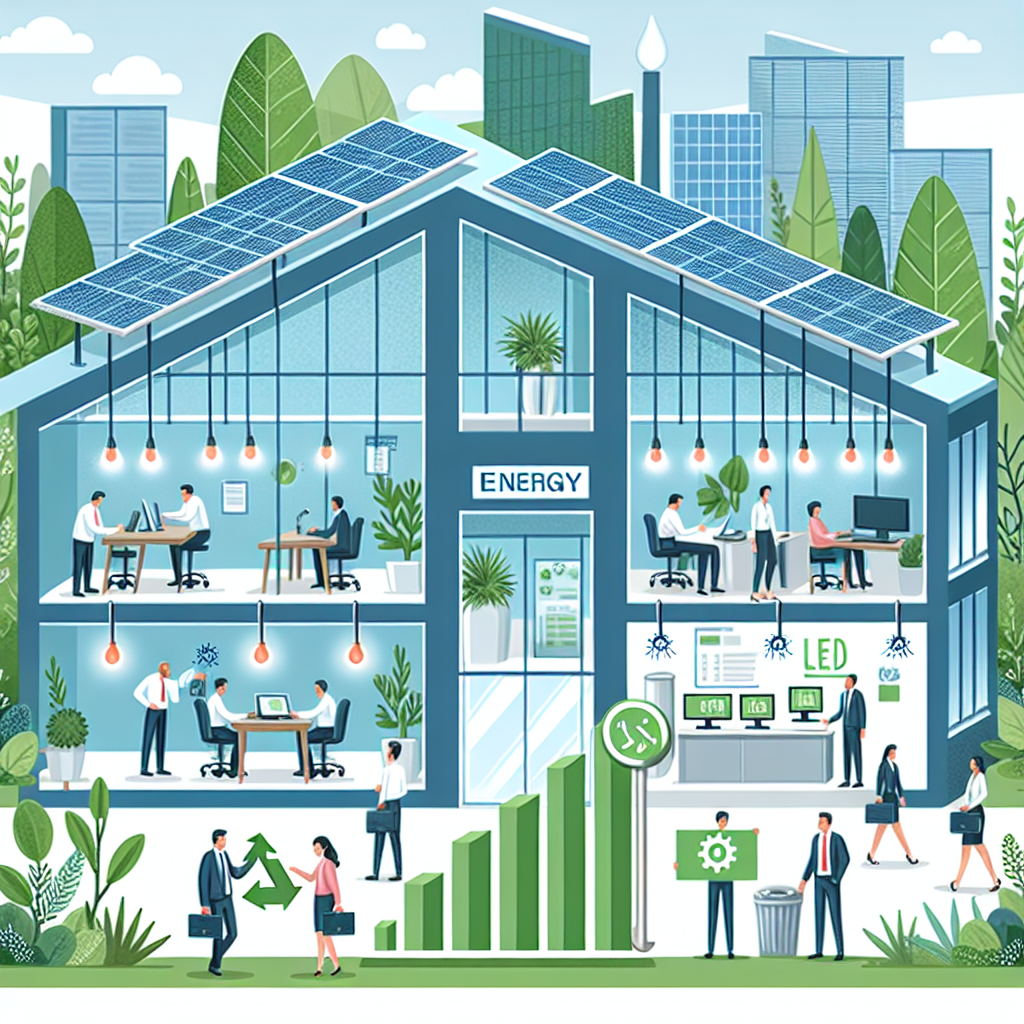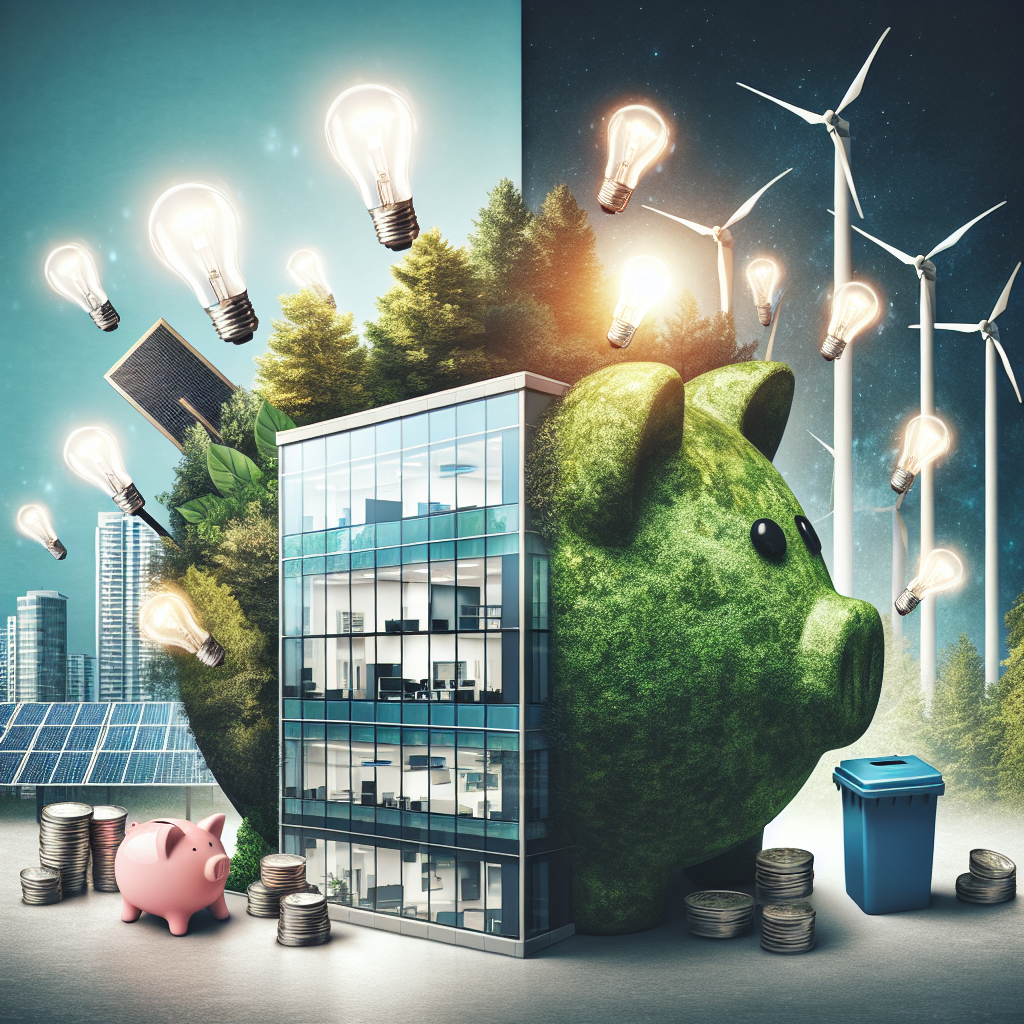Energy efficiency in companies is playing an increasingly important role in a world in which resources are becoming scarcer and climate change is gaining in importance. The question is not only how we produce energy, but also how efficiently we use it. Increasing energy efficiency can help companies save costs and protect the environment at the same time. In this article, you will learn about the importance of energy efficiency in companies, current energy saving methods and the costs that can be saved by improving energy efficiency. We will also look at the environmental damage caused by inefficient energy consumption, present technologies for increasing energy efficiency and highlight the benefits for companies. Regulatory and political framework conditions as well as future prospects and challenges relating to energy efficiency will also be discussed.
Importance of energy efficiency in companies
Energy efficiency plays a crucial role in today’s companies. Regardless of the size or type of company, the efficient use of energy helps to reduce operating costs and at the same time has a positive impact on the environment. It is not just a question of consumption, but a question of responsible management of all necessary resources.
By reducing energy consumption in your organisation, you not only improve your company’s financial performance, but also help to reduce global energy consumption and reduce harmful environmental impacts. Improved energy efficiency can help reduce CO2 emissions, improve local air quality and reduce dependence on fossil fuels.
Additionally, striving for energy efficiency makes you attractive to potential customers and investors who place more emphasis on sustainable practices and ecological awareness. It can also improve your company’s public image. Energy efficiency is therefore not only a cost factor, but can also be used as a strategic advantage.
Current methods for saving energy in companies

There are a variety of methods for saving energy in companies in order to reduce costs and at the same time make a contribution to protecting the environment. We would like to introduce you to some of these methods in this section.
One frequently used method is the use of energy-saving light bulbs. These require considerably less energy than conventional light bulbs and also last longer. Another advantage is that they generate less heat, which can contribute to a more pleasant room temperature, especially in offices with many workstations.
Another way to save energy is to optimise heating and cooling systems. Although these are often seen as a necessary cost, considerable energy savings can be achieved by controlling the systems more intelligently.
The introduction of energy efficient equipment is another method. Whether it’s computers, photocopiers or fridges, there are now energy-efficient alternatives for almost every appliance, which may be slightly more expensive to purchase, but will save costs in the long term due to lower energy consumption.
The use of renewable energies is another way of increasing energy efficiency in companies. Solar or wind energy can be generated and utilised directly on the company’s premises, for example by using solar panels on roofs or wind turbines on open spaces.
Finally, energy management is an effective method by which companies can continuously monitor, analyse and optimise their energy consumption in order to increase energy efficiency.
All of these methods not only help to reduce costs, but also make a valuable contribution to protecting the environment.
Cost savings through improved energy efficiency
Precise and reflective utilisation of energy is essential to reduce costs while maintaining or even improving performance. Improved energy efficiency offers one of the most cost-effective ways to reduce operating costs. The savings can be significant, as energy costs often account for a significant proportion of an organisation’s total cost of ownership.
Energy efficiency means less energy consumption for the same production output. For example, an energy-efficient machine can produce the same product with less energy than a less efficient one. But even simple measures, such as switching off devices or systems when they are not needed, can lead to significant savings.
There are various methods for improving energy efficiency, such as optimising existing systems or investing in more energy-efficient technologies. It can also be useful to train staff and raise awareness in order to promote energy-efficient behaviour.
An important step towards improving energy efficiency is to carry out an energy audit. This determines the company’s current energy consumption and identifies ways to reduce it.
Greater energy efficiency can lead to significant cost savings and at the same time increase a company’s competitiveness. In addition, improved energy efficiency contributes to climate protection as it reduces greenhouse gas emissions. It is therefore worth investing in energy efficiency.
Environmental damage caused by inefficient energy consumption
Are you wondering what impact inefficient energy consumption has on our environment? The answer is clear and obvious: it causes significant damage. High and inefficient energy consumption in companies is one of the main causes of environmental damage and global warming.
This is because energy is often generated from fossil fuels such as coal, oil and gas. Burning these fuels produces greenhouse gases that heat up the atmosphere and thus contribute to global warming. This leads to serious consequences such as rising sea levels, the melting of the polar ice caps and extreme weather events.
It’s not just direct emissions that put a strain on the planet. Just think of the enormous water consumption during energy production or the environmental impact caused by the extraction and transport of fossil fuels. In addition, the outdated and inefficient equipment in many companies produces a lot of waste and unnecessary emissions.
We all have a responsibility to protect our environment and efficient energy use is an important step in the right direction. It is time for companies to recognise their role and actively work to minimise their energy consumption and become more efficient.
Technologies to increase energy efficiency
There are numerous technologies that can help you improve energy efficiency in your company. Modern energy management systems, for example, offer extensive functions for monitoring and controlling energy consumption. They help to recognise unused potential and make targeted savings.
In addition, a wide range of technical solutions for buildings, lighting, heating and air conditioning as well as production facilities offer opportunities to increase energy efficiency. Modern lighting technologies such as LEDs save up to 90% of energy compared to conventional light sources. Intelligent building automation can help to further reduce energy consumption, for example by adapting heating and air conditioning to actual demand.
Operating equipment for production facilities such as motors, pumps or fans should also be checked for their energy consumption, as outdated technology often consumes unnecessarily high amounts of energy. It is worth replacing them with more efficient models.
Last but not least, renewable energy sources can also contribute to increased energy efficiency. Photovoltaic systems or wind turbines on site, but also the purchase of certified green electricity can be a sensible addition to cover your company’s energy requirements and protect the environment at the same time.
Advantages for companies: Improved image and sustainability goals
Increasing energy efficiency in your company not only brings benefits on a financial level, but can also lead to a significant improvement in your company’s image. Nowadays, awareness of environmental and climate protection has risen sharply among consumers and the general public. Companies that act in an environmentally conscious manner and maximise their energy efficiency can present themselves positively to the public.
In addition, measures to increase energy efficiency often also serve to achieve sustainability goals, which more and more companies are defining for themselves. These targets are not only important for the company’s reputation, but can also help to achieve competitive advantages and even have a positive impact on the company’s financial performance.
So if your company is prepared to increase energy efficiency, you will not only benefit from lower energy costs, but also from an improved corporate image and better positioning with regard to sustainability issues.
Regulatory and political framework conditions for energy efficiency
Regulatory and political frameworks have a significant impact on energy efficiency in companies. Governments around the world are implementing a range of policies and regulations to reduce energy consumption and thus minimise the negative impact on the environment.
In many countries, for example, energy saving targets have been set that companies must achieve. This can be achieved through various measures, such as the use of renewable energy or minimising energy loss by improving production processes.
There are also various incentives to encourage companies to become more energy efficient. These can include subsidies for the purchase of energy-efficient equipment, tax breaks or bonuses.
As an entrepreneur, it is important that you know the regulatory and political framework in your country in order to maximise and improve energy efficiency in your business. It’s not just about demonstrating compliance and avoiding penalties, but also about maximising the cost savings and sustainability improvements that can be achieved through energy efficient measures.
Future prospects and challenges around energy efficiency
The future holds some exciting prospects, but also challenges, when it comes to energy efficiency in companies.
Both new technologies and advanced business models are opening up new opportunities to increase energy efficiency. Digitalisation and automation in particular can improve energy efficiency in many areas, from production to building management. At the same time, the transition to these technologies requires a significant investment and requires the retraining of employees to ensure they have the necessary skills to handle these new tools.
At the same time, growing regulatory requirements and increasing consumer awareness of environmental issues are putting strong pressure on companies to improve their energy efficiency. However, this pressure can also open up new business opportunities, especially for companies that can act as pioneers in the transition to energy-efficient practices and technologies.
But there are also challenges. One of these is that many of the technologies that can help increase energy efficiency are still in the early stages of development and can therefore be expensive and immature. It can also be difficult for companies to obtain the necessary funding to implement comprehensive energy efficiency measures.
It is clear that the future of energy efficiency in business will be both exciting and challenging. But with the right combination of innovation, investment and political will, there’s no reason why we can’t overcome these challenges.



